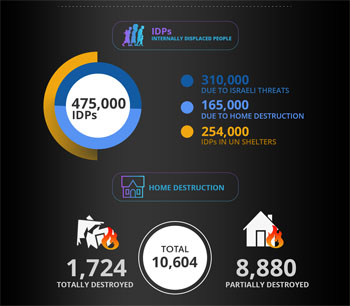Preface
The situation of the Palestinian refugees is one of the largest and most enduring refugee problems in the world. Discussions on allowing them to return to their former homes within what is now the State of Israel, on granting the refugees compensation, and on resettling the refugees in new locations, have yet to reach any definiteconclusions.
The number of Jews in Palestine was small in the early 20th century: most residents of Palestine at that time were Arabic-speaking Muslims and Christians. Beginning in 1914, with the outbreak of World War I, Britain promised independence for the Arab lands under Ottoman rule, including Palestine, in return for Arab support against the Ottoman Empire, which had entered the war on the side of Germany.
In 1916 Britain and France signed the Sykes-Picot Agreement, which divided the Arab region into zones of influence.Lebanon and Syria were assigned to France, Jordan and Iraq were assigned to Britain, and Palestine was to be internationalized.
In 1917, as stated in the Balfour Declaration, the British government decided to endorse the establishment of a Jewish homeland in Palestine. Jewish immigration into Palestine saw an immediate and dramatic increase.
In 1919 the Palestinians convened their firstNationalConference, expressing their opposition to the Balfour Declaration.
After WWII, at the 1920 San Remo Conference, Britain was granted a mandate over Palestine. The mandate was in favor of the establishment of a homeland in Palestine for the Jewish people. The terms of the Balfour Declaration were included in the mandate, which was approved by the Council of the League of Nations in 1922. By that year Palestine was effectively under British administration, and Herbert Samuel, a declared Zionist, was sent as Britain’s firstHighCommissionerto Palestine.
In 1936 the Palestinians organized a six-month general strike, to protest the confiscationoftheirland,andJewishimmigrationto Palestine.
In 1939 the British government published a new White Paper restricting Jewish immigration, and offering independence for Palestine within ten years. This proclamation was rejected by the Zionists, who then organized terrorist groups, and launched a bloody campaign against the British and Palestinians. Their aim was to drive out both the Palestinians and the British, and to pave the way for the establishment of a Zionist state.
In 1947 Britain decided to leave Palestine, and called on the United Nations to make recommendations. In response the UN convened its firstspecialsessioninMayof1947,andonNovember 29, 1947 it adopted a plan calling for the partition of Palestine into Jewish and Arab states, with Jerusalem as an international zone under UN jurisdiction. The population balance in the new state of Israel was drastically altered during the 1948 war. The armistice agreements extended the territory under the Jewish state’s control beyond the UN partition boundaries.
Historically, Palestinians consider a refugee to be a citizen from Palestine who was deported or fledfromhisorherowncountryduring the Zionist movement’s attacks launched against Palestinians after November 29, 1947. The Palestinian’s call this the Nakba, meaning “disaster” or “catastrophe”.
The United Nations definitionofa“Palestinianrefugee”isa person whose “normal place of residence was Palestine between June 1946 and May 1948, and who lost both their homes and means of livelihood as a result of the 1948 Arab-Israeli conflict.
About two thirds of Palestinians fledorwereexpelledfromPalestine as it came under Jewish control. This deportation continued until after the armistice that ended the war: these refugees were generally not permitted to return to their homes.
The Israeli government passed the Absentee Property Law, which cleared the way for the confiscationofthepropertyof refugees. The government also demolished many of the refugees’ villages, and resettled Jewish immigrants in many of the Arab’s homes in urban communities.
Whereas most of the world’s refugees are the concern of the UN High Commission for Refugees (UNHCR), most Palestinian refugees come under the older body of the UNRWA, established in the aftermath of the Nakba. The United Nations Relief and Works Agency for Palestine Refugees in the Near East (UNRWA) is a relief and human development agency, providing education, healthcare, social services and emergency aid to over four million Palestinian refugees
living in the Gaza Strip, the West Bank, Jordan, Lebanon and Syria.
On December 11, 1948, UN Resolution 194 was passed in order to protect the rights of Palestinian refugees. The Palestinian refugees believe in the “right of return”, based on Article 13 of the United Nations Universal Declaration of Human Rights: “Everyone has the right to leave any country, including his own, and to return to his country”.
To View the Full Book as PDF (1 MB)





